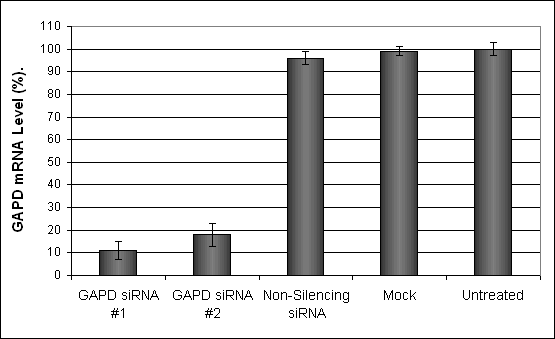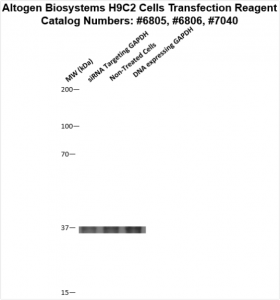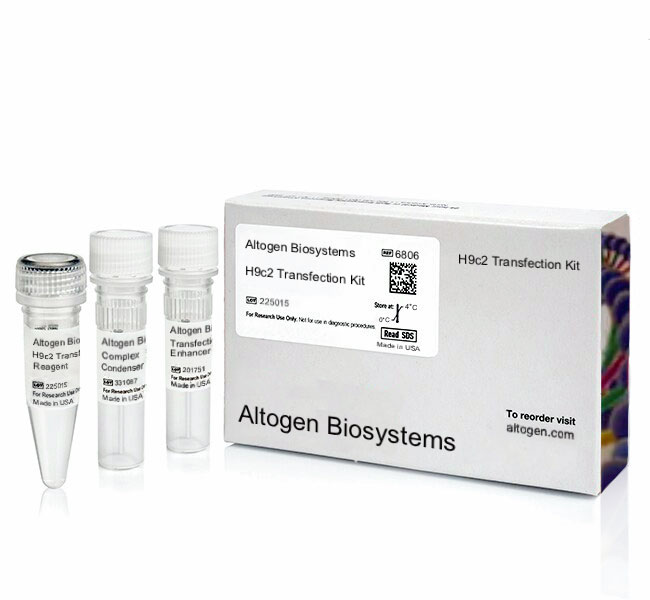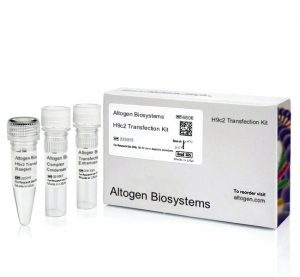Description
Purchase Orders: Click “Add to Cart” button to order, then email PO to orders@altogen.com.
Product Availability: In Stock.
Transfection Reagent for H9c2 Cells (Rat Embryonic Myocardium Cells, CRL-1446)
-
Proprietary cationic lipids formulation
-
High transfection efficiency of small RNA (siRNA, shRNA, miRNA), mRNA, pDNA
-
Kit includes Transfection Enhancer reagent
-
A proven reagent for establishing H9c2 stable cell lines
-
Optimized transfection protocols are adapted for use with both standard & reverse transfection methods
-
Download H9C2 transfection protocol: [PDF]
- Download H9C2 CRISPR/Cas9 transfection protocol: [PDF]
- Download PowerPoint presentation for H9C2 cells transfection kit: [PPT]
- UPC/GTIN/EAN: 860002089766
-
Brand: ALTOGEN®, developed and manufactured by Altogen Biosystems
Transfection Efficiency:
Reagent exhibits at least 82% transfection efficiency of siRNA delivery. Transfection efficiency was determined by qRT-PCR.
Product Description:
Transfection kit for H9C2 cell line, H9c2 cells are derived from embryonic rat heart tissue and are commonly used in biomedical research for studying cardiac biology, muscle physiology, and drug toxicity. Transfection reagent supplemented by complex condenser and transfection enhancer.
Transfection Protocol and SDS:
Download Altogen Biosystems H9C2 Transfection Protocol: [PDF]
Download SDS: [PDF]
H9c2 Cell Line:
Heart disease is considered the primary cause of death for both men and women that is responsible for more than 600,000 fatalities annually in the United States, according to the Centers for Disease Control and Prevention (CDC). Myoblasts are cells that have the ability to give rise to muscle cells. The H9c2 cell line was derived from the heart tissue of embryonic BD1X rat (Rattus norvegicus) and is comparable to human myoblasts. It possesses many skeletal muscle properties as well as exhibits a myoblast morphology. This cell line could be useful for studying the heart tissue of mammals, and in a variety of specialized research related to molecular and cellular biology. Acetylcholine (ACh) is a neurotransmitter that is part of the body’s parasympathetic response and can hence slow down the heart rate. Cells from the H9c2 cell line express ACh receptors and are often used as transfection hosts in the study of many myocardial diseases.
H9C2 is a rat cardiomyocyte cell line that was derived from embryonic heart tissue. H9C2 cells are widely used as a model system for studying cardiac physiology, pathology, and drug screening. H9C2 cells are characterized by their ability to differentiate into mature cardiomyocytes when treated with various agents, such as retinoic acid or dimethyl sulfoxide (DMSO). They express many of the markers of cardiomyocytes, including cardiac troponins, and exhibit many of the functions of mature cardiac cells, such as contraction and relaxation. Altogen Biosystems produces pre-optimized lipid-based high-efficiency transfection reagent kits for the H9c2 rat myocardium cell line.
Data:

Figure 1. GAPD mRNA levels were quantified using real-time RT-PCR in the H9C2 cells transfected with siRNAs targeting GAPD or non-silencing siRNA. Forty-eight hours post-transfection, the cells were harvested and analyzed by real-time RT-PCR for GAPD mRNA expression levels. Data were normalized against the 18S rRNA signal. Control samples were either mock-transfected or untreated. Values are normalized to untreated sample. Data are means ± SD (n=5).

Figure 2. Protein expression of GAPDH in H9c2 cells. DNA plasmid expressing GAPDH or siRNA targeting GAPDH were transfected into H9c2 cells following Altogen Biosystems transfection protocol. At 72 hours post-transfection the cells were analyzed by Western Blot for protein expression levels (normalized by total protein, 10 µg of total protein loaded per each well). Untreated cells used as a negative control.
Altogen Biosystems provides optimized transfection kits and electroporation products for life sciences and cancer research. Transfection protocols are optimized for individual cancer cell lines. Altogen Biosystems developed two types of in vivo delivery kits (animal transfection): 1) Tissue-targeted reagents (delivery of proteins, DNA, and RNA into liver, pancreas, or kidney tissues), and 2) Broad range in vivo biodistribution reagents (PEG-Liposome based reagent, Nanoparticle-based in vivo reagent, Lipid-based transfection kit, and Polymer-based kit). Advanced formulation of reagents and optimized transfection protocols provide efficient intracellular delivery of proteins, DNA, mRNA, shRNA, siRNA, and other negatively charged biomolecules in vitro and in vivo. Read more about transfection technology at Altogen’s Transfection Resource. Altogen Labs provides GLP compliant contract research studies for preclinical research, IND applications, and drug development. Biology CRO services include: Over 90 in-house validated xenograft models, development of stable cell lines, ELISA assay development, cell-based and tissue targeted RNAi studies, safety pharm/tox assays, and other studies (visit AltogenLabs.com).
Volume Options:
- 0.5 ml (Catalog #6805)
- 1.5 ml (Catalog #6806)
- 1.5 ml CRISPR (Catalog #2143)
- 8.0 ml (Catalog #7040)
Purchase Orders: Click “Add to Cart” button to order, then email PO to orders@altogen.com.
Product Availability: In Stock.






